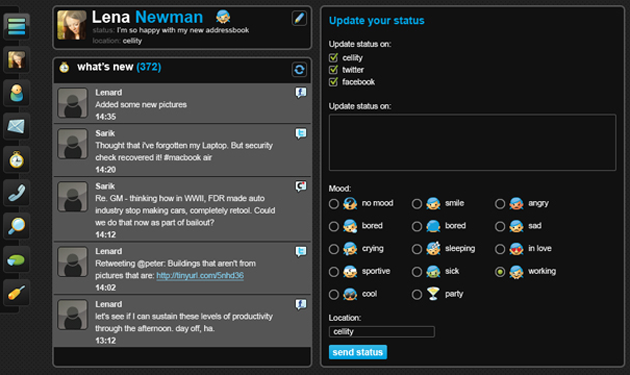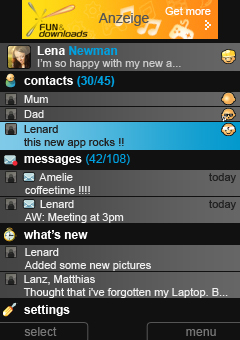German startup Cellity has unveiled its enhanced address book (called Addressbook 2.0) for mobile phones, now available in a private beta. The J2ME application allows users to aggregate data from across their Email boxes, social networks, and standard address books into a single intuitive application, bringing the functionality of a smartphone to the hundreds of more basic phones that support the Java platform. The company is offering 1000 invites to TechCrunch readers, which you can request here.
Beyond offering a complete database for contact information, the app allows users to place inexpensive phone calls over the company’s own PSTN network (which is similar to Jajah’s), and send free text messages. However, Cellity will also make a whitelabel version available in the future, which would allow cellular carriers to implement Addressbook 2.0 using their own native networks. The application also allows users to update status messages across multiple social networks.
Addressbook 2.0’s design is very polished, and is significantly more intuitive than most address books that come standard on cell phones. To get started, users import their friend lists from social networks including Xing, Facebook, LinkedIn, and Twitter, as well as from Email clients like Outlook. The service will automatically detect when a friend is found on multiple social networks and aggregate their data under a single profile without creating duplicates.
And because address books generated using social networks can grow very large very quickly, the site offers an online control panel to manage contacts. Users can create a database consisting of thousands of entries to be stored in the cloud, picking out the few dozen that they use most regularly to be stored on the phone (they can access the full list from their phones if they ever need it). The online panel also allows includes the same features of the mobile app, allowing users to place calls, send text messages, and update social network statuses.
The company estimates that the application will run on around 650 available phones, which are less sexy than the iPhone and Android but account for a much larger mobile install base worldwide. The company will see no shortage of competition, as there have been a number of other efforts to integrate social networks with mobile phones, including Yahoo’s OneConnect (though Cellity seems to be highlighting on more traditional address book functionality rather than social networking).

